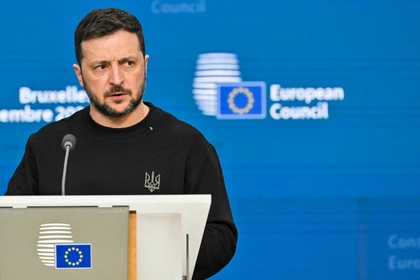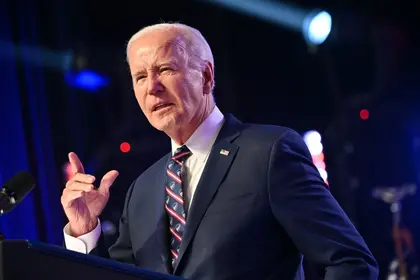Democratic leaders and donors on Friday tried to make sense of the devastating performance by President Joe Biden during the first televised debate of the 2024 election. From Kyiv to Berlin to Taipei, allies began to ponder the prospect of a return to the bully diplomacy in the form of a second Donald Trump administration. The normally staid The Economist probably summed up the situation best saying: “Joe Biden’s decision to seek re-election as America’s president rather than standing aside for a younger standard-bearer now looks like a reckless endangerment of the democracy he claims to want to protect.” On the same side of the ocean, the venerable Financial Times weighed in, saying: “Within minutes viewers were arrested by the sight of a frail Biden rasping through incoherent answers in a pivotal debate for which he had supposedly spent days preparing.”
In perhaps the most bruising post-debate reaction, the New York Times editorial board - a traditional backer of the Democratic Party and its leaders- said President Biden is engaged in “a reckless gamble” that will not end well. “The greatest public service Mr. Biden can now perform is to announce that he will not continue to run for re-election,” it said. The board added: “The clearest path for Democrats to defeat a candidate defined by his lies is to deal truthfully with the American public: acknowledge that Mr. Biden can’t continue his race, and create a process to select someone more capable to stand in his place to defeat Mr. Trump in November.”

Zelensky Says Trump and EU Must Work Together to Secure Peace
JOIN US ON TELEGRAM
Follow our coverage of the war on the @Kyivpost_official.
Biden recovered somewhat at a carefully stage-managed campaign in North Carolina yesterday, but as Tom Nichols of The Atlantic wrote: “He [Biden] looked vacant and slack-jawed while he watched others speak. He was animated at the podium—but that’s likely not going to be enough to win an election in which so many undecided voters think Biden is too old to be president.”
As New York Times columnist David Brookes told PBS The Newshour on Friday evening, speaking about Joe Biden: “It’s just really tough to be an insider right now .” He’s right. Whether you’re a Justin Trudeau or Emmanuel Macron or Rishi Sunak, opposing forces who spew falsehoods but who also spin a narrative that resonates (ie the system is broken) tend to do well on voting day. Sadly, it seems increasingly that calling out those who traffic in lies and exaggerations doesn’t have the same impact as previously.
National Public Radio reported Friday that despite widespread concern about Biden’s performance, top Democratic leaders are publicly standing by the president. House Minority Leader Hakeem Jeffries, asked about Democrats calling for Biden to drop out, said “that’s not my position.” When asked if Democrats can win back House with Biden on ticket he simply responded “yes.”
With less than a week until polling day, the Conservatives in the United Kingdom are heading for the worst general election result in their 190-year history, the Financial Times reported. Most analysts give Prime Minister Rishi Sunak little chance of getting reelected in his own seat and say that his campaign style has done little to lift the party’s fortunes. FT projections place the Conservatives at around 100 seats in the 500-seat House of Commons should an election be held today. The bad news doesn’t end there for the ruling Tories: another poll conducted June 26-27 puts them at a dismal three points behind the far right wing populist Reform Party led by Nigel Farage
Taiwan issued its second-highest travel warning for Hong Kong, telling the self-ruled island's residents to avoid non-essential travel to the city due to its national security laws and cases of Taiwanese being detained on mainland China. Taiwan's Mainland Affairs Council said an "orange" travel warning had been issued for the mainland, Hong Kong and Macau. "There have been several cases of citizens going to mainland China and getting illegally detained, kept and interrogated," it said. It also brought up a judicial guidance issued by Beijing earlier this month, which stated "diehard" Taiwan independence separatists could face the death penalty in extreme secession cases. “[This] seriously threatens the personal safety of [Taiwanese] people travelling to mainland China, Hong Kong and Macau," the council said. The statement also cited Hong Kong's Safeguarding National Security Ordinance and the national security law as reasons for the warning. - Bangkok Post
And finally…The New Statesman’s Katie Stallard (formerly of Sky News and a journalist I admire) had this takeaway from the recent bromance meeting between the leaders of Russia and North Korea - and their joint security pact: “The immediate effects will be felt in Ukraine, where Putin’s war will now be sustained by a functionally limitless arsenal of North Korean artillery shells and ballistic missiles. US officials said that Pyongyang has sent Russia 11,000 containers of munitions in the past year, alongside the lethal drones allegedly supplied by Iran, and the microelectronics and economic lifeline provided by China. Gone is any illusion that the consequences of this war can be confined to a single continent. Following the summit, South Korea said it would consider supplying weapons to Ukraine, with Putin threatening to arm North Korea in response. ‘These theatres are totally connected now,’ said Victor Cha, senior vice-president for Asia and Korea chair at the Center for Strategic and International Studies think tank in Washington and a member of the Pentagon’s advisory board. ‘We are in a situation where North Koreans are effectively now killing Europeans, and that hasn’t happened since the Korean War.’”
You can also highlight the text and press Ctrl + Enter






